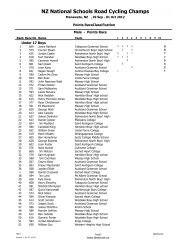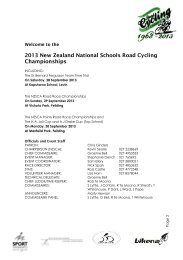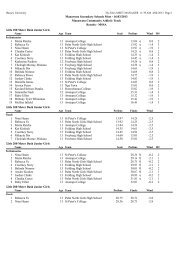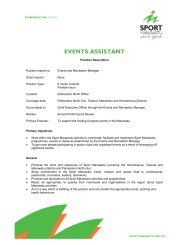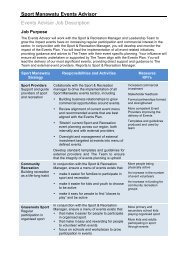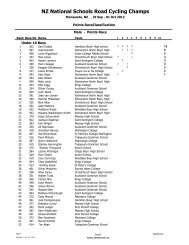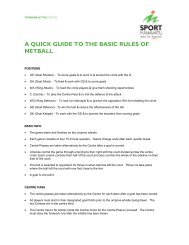Module Seven: Sport Psychology - Sport Manawatu
Module Seven: Sport Psychology - Sport Manawatu
Module Seven: Sport Psychology - Sport Manawatu
You also want an ePaper? Increase the reach of your titles
YUMPU automatically turns print PDFs into web optimized ePapers that Google loves.
EXPLAIN THE IMPORTANCE OF PRE-COMPETITION MENTAL PREPARATIONElite sporting performance requires peak levels of physical and psychological readiness. Athletes must plan toinclude mental skills in their training and practise programme. This means helping athletes develop strategieswhich allow them to enter competition with the proper mindset, and to perform consistently at their highest level.If athletes are interested in getting the most out of their sport, they can no longer treat their performance as acombination of isolated factors which come together in some mysterious and unified way on the day ofcompetition.‘PSYCHING UP’There is an ‘ideal performance state’ (thoughts, feelings, bodily responses) typically associated with peakperformance. The ultimate goal of mental skills’ training is for each athlete to consistently achieve the ‘idealperformance state’ at competition time. This will rarely occur if pre-competition preparation (the ‘psych up’),and the competition focus are left to chance, or if these are left in the control of others(e.g. coach, captain, parents). More often than not, individuals do not have a consistent pattern in readyingthemselves for competition (the ‘psych up’ procedures). Performance is likely to be improved if an individual’spreparation becomes more systematic. We seldom identify and systematically practise mental preparation skills.Yet, after the competition the greatest percentage of excuses are attributed to the mental and emotional aspects ofthe event!MENTAL WARM-UPThe mental preparation of the ‘countdown-to-competition’ ritual should consist of getting athletes physically andmentally ready for competition. Athletes need to develop a ‘mental warm-up’ to go with their ‘physical warmup’.This means monitoring and controlling emotions and thoughts so that the energy and excitement forcompetition build up slowly, without the individual becoming aroused (psyched up) too soon, or becoming soover aroused (psyched out) that feelings of anxiety and worry, rather than excitement and challenge occur.ACHIEVING CONSISTENCY IN PERFORMANCEAny athlete who participates competitively faces stressful situations and anxious moments hundreds of timesduring the course of their competitive career. For many, regardless of how many times they have been in thatsituation, they will still react in a negative way. Somehow, experience is not always the best teacher in this case!Individuals who are able to continue performing with some degree of consistency, despite their feelings ofanxiety, have learned to cope with this anxiety. Many athletes with superior physical capabilities have beensystematically eliminated from competitive sports because they could not perform with any consistency. They




